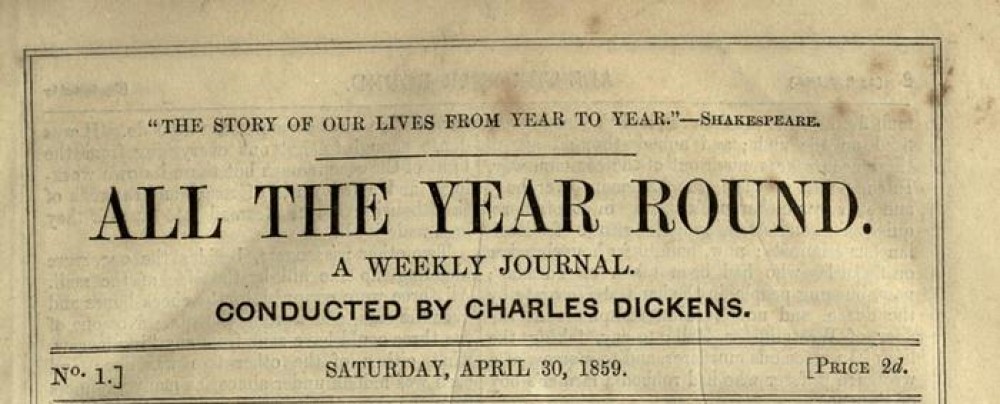Now that the dust has settled and we can look upon the novel as a whole, it occurs to me that we’ve just had three weeks of ATOTC where Lucie barely figures – when she does, it is largely through the report of others, she has only two lines of dialogue in the last three instalments. This is quite troubling given that early on we were identifying her as the heroine of the piece given the consistency of her presence in most of the instalments.
The lack of her presence come the end of the story (or reduced presence perhaps, is fairer to say), does hint at greater concerns about the character,who is hugely significant to the plot, but doesn’t actively instigate much action herself. She does two great deeds – going to France to save her father, and then going to France again to save her husband (although, in the end, she doesn’t do that much to save him). The rest of the time her significance as a plot device is in inspiring action and emotion in others – her presence itself is the greatest factor in her father’s recovery she also is the subject of three proposals, and it is for her that Carton lays down his life – if he’d not met her, if Darnay had married someone else, then we’d be looking at a different fate for Charles I fancy. I’m not suggesting Lucie deliberately and maliciously kept in touch with Carton just so she could use him one day to save Darnay – that would be crazy – but her influence has a lot to answer for both as a positive and negative force.
We’ve talked about contrasting her with Madame Defarge, so consider the significance of this pairing. Madame actively goes out and facilitates change, consciously inspiring others to terrible deeds and deliberately setting out her machinations to entrap the Manettes and Darnay – Lucie, as the flipside to this, is arguably no less a dangerous character, albeit one who acts without awareness of the impact she is having on others around her. That her personality is benevolent does not detract from the chaos in her wake. I don’t think Dickens intended this, but just as Ben was talking about the subsequent use of Carton as an inspiration for men to seek noble deaths, so too in creating a character so lovely and loved, Dickens has created an unintentional monster of sorts, a nineteenth-century Helen of Troy.

That’s an interesting thought, Pete, but at what point to the other characters lose free will?
Can we really blame Lucie’s influence for Carton’s suicide? Her influence on her father is for the better, certainly. One could argue that her influence on Carton is for the better as well . I thinks he makes it pretty clear in Fellow of No Delicacy that she isn’t what keeps him down–his situation is of his own making, and for reasons that are never quite elucidated, he can’t just “Pull himself up by his bootstraps”. Perhaps he is mentally ill. In this, I think Carton and Dr. Manette have a lot in common, neither of them is physically imprisoned, but both of them are a psychological mess do to how they operate psychologically combined with events in their past.
I am going to be a huge downer and say that if it wasn’t for her influence they probably would have found him dead in a gutter somewhere. If you view it like that, her inspiration does help him redeem himself in the eyes of himself and others. Ben’s going to say I’m not being terribly life-affirming here, but I think that that’s kind of the point. Sydney Carton can’t just get some happy pills. He needs some incentive to turn his life around which is external to himself and which doesn’t involve Lucie loving him back.
Man, I fail at spelling and grammar on this blog.
I think you ARE being life-affirming! You’re showing how, even if a given person’s influence over others is limited, that person can still be a force for good.
On another note: I wonder, do we sometimes underestimate the influence of Carton’s alcoholism? You hear a lot of people — and I’ve been one of them myself — wondering why on earth he can’t pull himself together. But the world is full of alcoholics who are unable to do it by themselves . . . and I don’t suppose there was a Victorian version of AA to help them out.
And if he had alcoholism plus depression, as I think the text suggests, that’s even more lethal.
That’s an excellent point, Gina. It’s fascinating that Dickens, who was famously so driven that he worked himself into an early grave, identified so closely with a character overwhelmed with depressive apathy and self-loathing. I wonder if Dickens’s strong feelings for, and identification with, both of the self-sacrificing male heroes of ‘The Frozen Deep’ and ‘TOTC’, tells us something interesting about his own psychology. Was there an element of guilt or a need to atone behind his notorious, self-punishing work ethic? Again, we’re reminded of the compulsive shoe-making of Dr Manette. It’s interesting that Dickens’s next male hero is the selfish but guilt-ridden Pip who is made penitent and humble by his bruising experiences.
Yes, it’s interesting how Carton and Dr Manette mirror one another in terms of their trauma and psychological struggles. I’m really fascinated by your point about Carton finding purpose through something external (Lucie) which doesn’t have to reciprocate. I feel as if there is something complex and fascinating about religion, God and worship going on here which I can’t quite unpick right now!